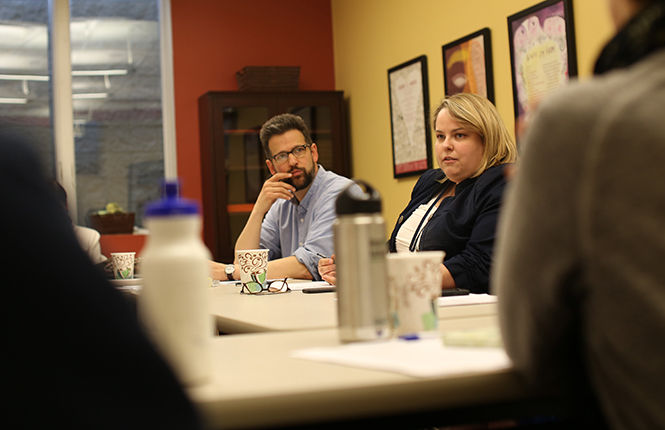Wick Poetry Center, May 4 Visitors Center find clarity through poetry
Mindy Farmer, director of the May 4 Visitors Center, speaks to participants in a workshop about overcoming trauma through creative writing. The event was held at the Wick Poetry Center on April 6, 2015.
April 6, 2015
With May 4’s 45th anniversary of the May 4th 1970’s shooting less than a month away, the May 4 Visitors Center and Wick Poetry Center joined to discuss what trauma really is and how to nurture it and heal with the “Overcoming Trauma through Creativity” event on Tuesday.
Psychiatric nurses, pastors, architects and yoga teachers were among the attendees wishing to further their writing skills and learn more about creativity as a healing process.
Mindy Farmer, director of the May 4 Visitors Center, initiated discussion with a circumstance taking place a few weeks back. She described to attendants a man who walked into the center, handed over a poem and left shortly after.
Farmer said it is not unusual for people to come to the center and leave items ¬— whether it is a music video or a piece of writing.
Author Michael Eisenhauer, described the events of May 4 in his own prose in the poem titled “Outrage: A Four Hour Walk — a Forty Year Journey.” Eisenhauer’s poem is introduced with a stapled introduction, “layered with opinions based on what I experienced that day and of subsequent thoughts spanning decades.” Forty years later, the poem found its way into Farmer’s hands, and shortly after, David Hassler’s.
Hassler, the director of the Wick Poetry Center, led the discussion of the evening beginning with Eisenhauer’s poem and ended with a Lisel Mueller free-verse poem titled “Curriculum Vitae” or life’s path.
“Curriculum Vitae” tells the story of Mueller’s emigration from Nazi Germany to Chicago, Illinois, finding love, losing her parents and discovering her childhood home closed off from her and everyone else. In the poem, Mueller describes the loss of her mother as what “hurt her into poetry.”
“We’re meant to meet a poem halfway with our lives… it’s about how does the poem be a living coal to a new listener and bring value to a new situation?” Hassler said. “When we feel the permission to complete it with what we need to hear it say and how it resonates, then that’s the conversation we want to have.”
Hundreds of people every year visit the May 4 Visitors Center from all over the country to fulfill something, Farmer said. The center acts as a healing place for many to face their own trauma, which is why the event worked to connect therapeutic writing with events of May 4.
“People who were there (on May 4) feel it; students here now feel it,” Farmer said. “It’s in pop culture, and now we’re dealing with it with ‘Mad Men’ covering it on Sunday. We want to give a serious term to it because people who come to the center deal with it in a serious way.”
Hassler said the death of the four students hurt Kent State into poetry and creative spirit.
He said overcoming trauma is discoverable through identifying the issue and vocalizing it.
“Far more powerful healing happens when patient finds creatively and immense joy his her own clarity and articulation,” Hassler said, quoting author and psychotherapist Mark Epstein.
Contact Payton Moore at [email protected]

























